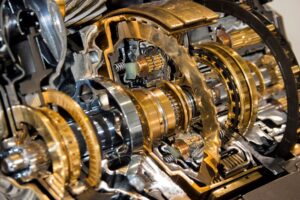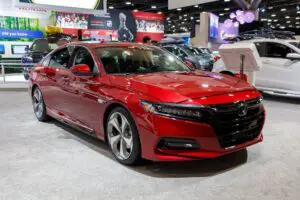The Accord has been ranked as one of the best-selling vehicles in the United States for several years for a good reason.
It is known for its reliability and good performance. However, some problems can occur with this vehicle.
These issues include transmission problems, which owners and potential buyers should know about.
These Honda Accord transmission problems can pose a real risk to the driver if they occur at the wrong time.
Some of the most common symptoms that can be seen due to transmission issues are:
- Whining Sounds
- Delay In Shifting
- Burning Smell
- Grinding When Shifting Gears
- Leaking Transmission Fluid
- Erratic Downshifting
- A Sudden Decrease In Speed While Coasting
- CEL Turned On
- Car Entering Limp Mode
As you can see, when the transmission is not working as intended, there are a lot of signs and symptoms exhibited by the Honda Accord.
This article will go into detail about all of them and list the years that had the most issues.
Table of Contents
9 Signs Of Transmission Problems In A Honda Accord

It’s always a good idea to keep an eye on your Honda Accord, regardless of whether you have any transmission problems.
If you need help determining what signs to look for, this section will help you identify some of the most common indicators of an issue with your transmission.
1. Whining Sounds
When the transmission fluid level is too low, it may not lubricate its moving parts properly. This can cause friction between the parts, which results in a whining sound as you drive.
Consequently, this could be due to the fluid being completely broken down or the fluid line itself becoming clogged, which can happen if it is not changed regularly.
If you can see that the sound is becoming progressively loud, then it is most certainly the converter that is the source of the issue.
2. Delay In Shifting
If there is a shift delay, it could be because the transmission has been used frequently.
This is especially common if you have been driving your Accord for years. While it’s true that the transmission fluid can cause this problem, it’s not the only culprit.
Faulty shift solenoids and failing transmission pumps can also be responsible for this issue. The valves don’t work as intended if the solenoids are to blame. This results in a delay.
Similarly, if the pump fails, it cannot create enough pressure to meet the transmission’s demands.
3. Burning Smell
A burning smell from the transmission can happen when the fluid level is low or dirty.
When the fluid is low, it can’t cool down all parts of the transmission and cause heat buildup, which can lead to a burning smell being emitted.
If you do confirm that the fluid level is more than enough, then there is a good chance that it is dirty. An impure fluid will certainly not work as efficiently as one with no contaminants.
Another possible reason is that the Honda Accord has been operating for hours, and the transmission has not had time to rest.
4. Grinding When Shifting Gears
When you’re driving your Honda Accord, and suddenly the gears start grinding while you’re shifting, it can throw off your whole drive.
That’s because your transmission is supposed to have a smooth, quiet ride, but that’s not what you’re experiencing.
First, you might have a problem with one of your transmission gears. If the gears are not in sync, it will cause a grinding sound when you shift them.
The same thing can happen if one or more of your gears are chipped or worn down due to age.
5. Leaking Transmission Fluid
One of the most common reasons of the leaking transmission fluid could be wear and tear. The transmission pan gasket could be broken or damaged, so the fluid will leak out of the pan.
Moreover, the drain plug may also be cracked, allowing fluid to leak. The fluid line itself could be cracked.
Although it is rare for something like this to happen, it is not entirely out of the question.
6. Erratic Downshifting
If the Honda Accord is experiencing erratic downshifting, it can be due to a failing downshift solenoid.
The downshift solenoid is what moves the transmission into a lower gear. This decreases the ride quality.
Hence, if faulty, it can cause the Accord not to shift smoothly, making it look like the process is erratic.
Another reason for erratic downshifting in an Accord could be a faulty vacuum line for the vacuum modulator valve.
However, this happens on older models only and can cause the transmission to shift erratically.
7. Sudden Decrease In Speed While Coasting
You drive in a Honda Accord and experience a sudden decrease in speed when in neutral could likely be due to the grade logic control system.
The system prevents your car from rolling backward when traveling up an incline.
However, if this system isn’t working properly, your car may not be able to detect when it’s going downhill and therefore won’t be able to slow down accordingly.
This can lead to braking too suddenly when coasting, which is commonly done to reduce fuel consumption.
8. CEL Turned On
The check engine light (CEL) is one of the most dreaded lights on your dashboard.
It can turn on for so many different reasons that it’s impossible to provide an exhaustive list, but I can tell you that transmission problems are one of the most common causes.
If you notice your CEL light turning on and you have a Honda Accord, there’s a good chance that your transmission needs attention.
Any transmission problem can result in the CEL light turning on. The most common cause is a problem with the fluid level or pressure in the transmission.
9. Car Entering Limp Mode
This issue is a problem with the car’s transmission and is caused by low fluid levels.
It only happens when the fluid level has reached a point where normal transmission operation is impossible.
As a result, the ECU will turn off the solenoids, preventing further damage from occurring to your transmission. When this happens, the car won’t go above 30 mph.
How To Prevent Your Honda Accord’s Transmission Issues
The Honda Accord is a great car, but it’s not perfect. Luckily, there are some simple things you can do to help prevent transmission problems.
So, it can stay problem free for as long as possible:
1. Use High-Quality Transmission Fluid
Your Honda Accord’s transmission fluid keeps your car’s gears from grinding together when you shift gears, so it’s important to use high-quality fluid that will stay in good condition for as long as possible.
Regularly check the level of your transmission fluid and never let it get below the recommended level—you should also check for leaks and repair any you find.
2. Use The Parking Brake When Stopped
Always ensure you’re using the parking brake whenever you stop in traffic or at a stoplight.
This will reduce pressure on output shafts, which helps keep them from wearing down too quickly or breaking entirely.
3. Don’t Downshift To Slow Down The Vehicle
Downshifting when driving in a high gear causes excessive stress on your transmission and will eventually wear out its components faster than normal braking.
Use the brakes gradually to slow down to a stop.
4. Don’t Let It Overheat
One way to prevent transmission problems is to keep the Honda Accord cool.
When your Honda Accord overheats, the transmission fluid can get hot enough to burn off its lubricating properties.
The transmission fluid also passes through the radiator, where it can absorb the heat if it is hot.
How To Fix The Honda Accord’s Transmission Problems

If you’re experiencing transmission issues in your Honda Accord, it’s important to determine what type of problem you’re dealing with.
In most cases, the issue is as simple as overheating or gears grinding.
Topping off the fluid is enough to get your car back on track if that’s the case.
The car has a leaky transmission?
You will need to replace the seal with a new one. The entire seal will have to be replaced if they are too big.
Small leaks can be fixed using additives that simply add to the transmission fluid. However, if the issue is more serious, you may need to replace or rebuild the transmission entirely.
This will require more time and money than adding more fluid, but it is a much more permanent solution that should last longer than simply topping it off again in a few months.
Which Year Did Honda Accord Have Transmission Troubles?
The Honda Accord has been in the market for quite some time, and it has already been established that it has had many transmission issues.
Here are some of the models that can have these issues:
2001 Honda Accord
The 2001 model had many transmission complaints. The most common issue was that the transmission would fail. There were also complaints about it slipping and shifting roughly.
2002 Honda Accord
With the 2002 Honda Accord, the transmission would slip and jerk. It would also hesitate while accelerating, degrading the sedan’s driving experience.
2003 Honda Accord
The transmission on the 2003 Honda Accord tended to fail on its users. This means that it would need to be replaced, which is costly. It would also shift improperly at times.
2004 Honda Accord
Things did not improve in the coming year. People still reported transmission failure with the Accord.
It would also slip and jerk while making a vibrating sound. This suggests a serious issue with it.
2007 Honda Accord
Once again, many unfortunate owners would suffer from it’s failing on them. It would also downshift unexpectedly. There were also reports of it leaking transmission fluid.
2009 Honda Accord
The torque converter on the 2009 Honda Accord had a torque converter that would shudder. It would slip and also produce a roaring sound.
2013 Honda Accord
When accelerating, the transmission slipped and hesitated on the 2013 model too.
There was also an issue of it downshifting when coasting. This problem was discussed in this article before.
2014 Honda Accord
The 2014 Honda Accord did not have many issues regarding transmission, but it was not perfect in this regard.
It would downshift roughly. It would also roll backward when in neutral.
2015 Honda Accord
Not too many issues were reported with the transmission of the 2015 Honda Accord. It would hesitate and shift hard, but these problems were not widely complained about.
2016 Honda Accord
The final model on this list is 2016 one. It tends to shift roughly. It would also produce a lot of noise when working, which makes the driving experience not worth it.
Related: https://taxihack.com/best-and-worst-years-for-honda-accord/
Frequently Asked Questions
Q1. How Much Does A Honda Accord Transmission Replacement Cost?
Replacing the transmission on the Honda Accord can cost anywhere from $3000 to $4000.
The labor costs will be separate, reaching up to $1200. Now, this is the price for the transmission only.
Q2. What Is The Lifespan Of A Honda Accord Transmission?
The lifespan of the transmission on the Honda Accord is around 150,000 miles. This is pretty much less.
This number is not fixed and can be increased to more than 200,000 with the proper preventative measures and care.
Related: https://taxihack.com/how-long-do-honda-accords-last/
Q3. Is It Safe To Drive A Honda Accord With A Bad Transmission?
It is never a good idea to drive with a faulty transmission, regardless of which model of the Honda Accord you own.
You risk damaging the system even further, leading to a replacement being your only option.
Conclusion
When it comes to the Honda Accord, there are a lot of things you can say about it.
You can talk about how it’s one of the best vehicles on the road today, or you can talk about how reliable it is.
But if you want to get down to it, what matters most is this question is related to the Honda Accord transmission problems.
Although the Honda Accord is known for being a reliable car, its transmission is an exception.
It has been a source of contention for many users. You should not dismiss buying one due to these issues, as they are addressable and preventable too!
Honda did improve their game in recent years, but the problems have not been alleviated entirely.

I am Tahir Azam, and I have been writing amazing articles for TaxiHack for as long as I can remember. I know everything that is to know when it comes to automobiles and is always on top of industry news and developments. While I am not an expert by any means, I pride myself on knowing the ins and outs of many different problems and, of course, their solutions. The articles on our website are some of the best and well-researched content that you will find, and I spend countless hours making sure this remains to be true. This is why I ask you to take your time out and read some of my articles, especially if you find a topic that resonates with you or is something you are looking into. This way, you will find the perfect mix of information and tips on your desired topic. Learn more about Tahir.



